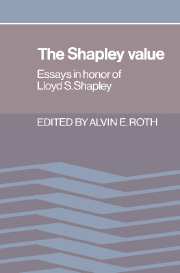Book contents
- Frontmatter
- Contents
- Preface
- 1 Introduction to the Shapley value
- I Ancestral papers
- II Reformulations and generalizations
- III Coalitions
- IV Large games
- 13 Values of large finite games
- 14 Payoffs in nonatomic economies: an axiomatic approach
- 15 Values of smooth nonatomic games: the method of multilinear approximation
- 16 Nondifferentiable TU markets: the value
- V Cost allocation and fair division
- VI NTU games
16 - Nondifferentiable TU markets: the value
Published online by Cambridge University Press: 13 October 2009
- Frontmatter
- Contents
- Preface
- 1 Introduction to the Shapley value
- I Ancestral papers
- II Reformulations and generalizations
- III Coalitions
- IV Large games
- 13 Values of large finite games
- 14 Payoffs in nonatomic economies: an axiomatic approach
- 15 Values of smooth nonatomic games: the method of multilinear approximation
- 16 Nondifferentiable TU markets: the value
- V Cost allocation and fair division
- VI NTU games
Summary
Abstract
TU economies with private production are shown to have a value, as defined in Mertens (1988), without any differentiability or interiority or other restriction. An explicit formula is given, describing the value as a barycenter of the core, for a probability distribution depending only on the set of net trades at equilibrium.
Introduction
We prove existence and exhibit the formula for the value of transferable utility markets, getting rid of differentiability assumptions and allowing for private production (as a first step toward removing the Aumann—Perles assumptions and the monotonicity assumptions). Under differentiability assumptions, the treatment by Aumann and Shapley yielded equivalence with the core. In the nondifferentiable case the more powerful value constructed in Mertens (1988) is required. In particular, whereas the differentiable case uses the symmetry axiom only in a “first-order” sense—comparable to the strong law of large numbers—in the nondifferentiable case it is used in its full force, in a “second-order” sense—comparable to the central limit theorem. But contrary to the case of the central limit theorem, no normal distribution appears here. Indeed, as shown in Hart (1980), the formulas involving those would satisfy only a restricted symmetry property (and are not characterized by it), so no value would be obtained.
- Type
- Chapter
- Information
- The Shapley ValueEssays in Honor of Lloyd S. Shapley, pp. 235 - 264Publisher: Cambridge University PressPrint publication year: 1988
- 4
- Cited by



